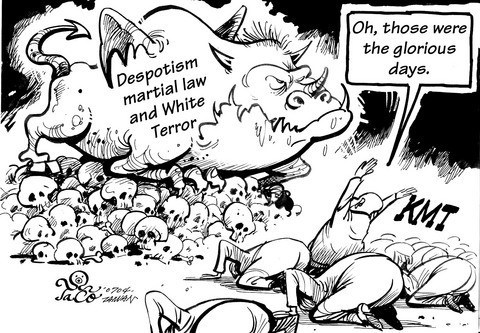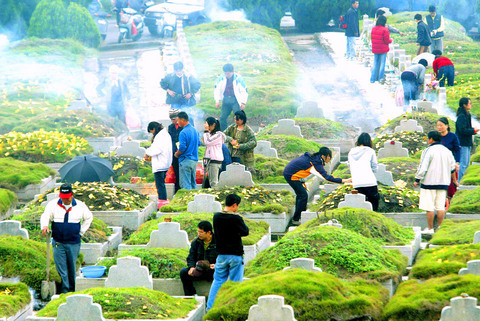
(Cartoon from the Apr 2/07 ed of the Taipei Times.)
Pitiful, really. From last Saturday’s pro-Chiang march:
The main opposition Kuomintang (KMT) staged a march in Taipei near the Presidential Office yesterday afternoon to protest a government campaign attacking the legacy of late President Chiang Kai-shek, 32 years after he died in 1975.
[…]
During the rally, former KMT chairman Ma Ying-jeou, who is considered the frontrunner in the 2008 presidential race, conceded Chiang had made errors, but told the protesters that historical figures must not be unfairly judged.
"No historical figures were perfect, and we could reassess Chiang’s legacy but must not deny all of his accomplishments," Ma said.
"He wasn’t a saint, he was like you and me and [could] make mistakes, which we will review," he said. "But don’t write him off completely because of them," Ma continued.
Now, I done some bad things in my time. Never sentenced men that I knew were innocent to political prisons or death, though. So in that sense, Chiang wasn’t EXACTLY like me. And in all likelihood, he wasn’t like any of you, either.
A Taiwanese independence group held a less flattering protest at the Chiang Kai-shek Memorial a day later, performing mock funeral rituals:
Traditionally, sealing the coffin — when family members hammer nails into the lid to seal it — is the last part of a funeral before burial.
Wang presented a sharp metal stake with a sign that read "Site for future Taiwan Democracy Memorial Hall" and asked all participants to hammer it into the ground. [Taiwan’s president is trying to rededicate the Chiang memorial as a Democracy hall – The Foreigner]
As he hammered, a member of the crowd shouted: "Let’s seal it so the evil spirit of Chiang Kai-shek will never be able to get out again!"
Undeterred, the Chinese Nationalist Party (KMT) held yet another pro-Chiang rally a few days later, on the anniversary of the former dictator’s death. "Destroy Taiwan independence" was one of their slogans. (Given the party’s obstruction of the special arms bill, I’d say they’re doing a bang-up job at that.)
After the initial rally, the Taiwan News had some food for thought about one of Chiang’s reputed accomplishments:
The common myth that the [KMT] takeover saved the Taiwan people from "the Chinese Communist bandit regime" [after World War 2] is merely a historical "what if" that excludes numerous other possibilities, such as United Nations trusteeship or the granting of independence to a government formed by the Taiwan people.
Precisely. Though there is another, more depressing, possibility. Had the KMT not come to Taiwan, the Taiwanese might have foolishly welcomed re-unification, even with the communists. They did, after all, cheer during the early days of post-war re-unification, prior to the KMT’s depredations. What really would have happened is unknowable, by both Chiang defenders and detractors.
The Taiwan News also described the KMT’s unhealthy nostalgia:
…the event’s real aim was to "review the good fortune and prosperity brought to Taiwan in the era of the two Chiangs [Chiang Kai-shek and his son, Chiang Ching-guo – The Foreigner]," according to KMT Acting Chairman Chiang Pin-kin. Another KMT spokesman openly expressed the hope of restoring the "golden age" allegedly experienced by Taiwan in the 1950s and 1960s thanks to the "two Chiangs."
Chiang surely did SOME good for Taiwan, but in the final analysis, it doesn’t matter. No democratic country ought to glorify former tyrants, build statues in their name, or speak of "golden ages" of dictatorship. That’s bad – no, DANGEROUS – for that country’s democratic soul. When certain parties in Taiwan make a fetish out of the "oneness of purpose" that existed prior to democracy, they shouldn’t be surprised when the youth of Taiwan subsequently begin forming Hitler fan clubs out of admiration for the even greater unity that existed in Nazi Germany. For it is their example which leads the way.
i-1

